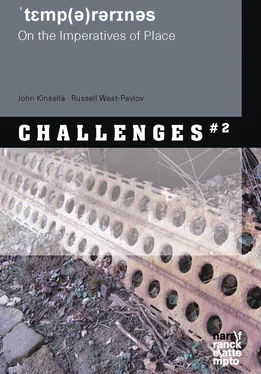RWP
‘Of the Progress of the Soul’
When the government of Western Australia uses its shock troops—the police, of course, but also the Main Roads and their private contractors—against the people and the environment, they are not swayed from their purpose by protest, even where that protest succeeds to some extent. They are working through military solutions to their problems of opposition, and ‘outflank’ those who are concerned with the destruction of natural habitat. If one front is under pressure, open up another.
While a large amount of protest energy has rightfully been focussed on the Beeliar atrocity, the government has been determinedly destroying native vegetation and habitat as well elsewhere. The extreme and gratuitous removal of trees along the York-Quairading Road is one example, but such acts on an even larger scale have been happening along the Great Eastern Highway between Southern Cross and Kalgoorlie for many months.
And recently we’ve been seeing the wholesale removal of tall marri trees (in wondrous bloom at the moment) from along the Toodyay Road north of Gidgegannup (especially at intersections), and also the removal of vegetation alongside and between the double lanes of the dual carriageway of the Great Eastern Highway in the Eastern Hills between Glen Forrest and Mundaring. The trees are/will be gone for good. While the ‘upgrades’ are being implemented for ‘safety’, it’s obvious to many that all opportunities are taken to destroy as much vegetation as possible in the process. We see the same with ‘fencing’ on private land—the fencers often destroy vegetation on the ‘long paddock’ side of the fence with impunity, and there’s a recent case locally of bush from a nature reserve being cleared in the process of fencing private land.
These actions slip ‘under the radar’, which is why we need to entirely rethink the way protest is used to resist these destructions. Global fascism has almost completely absorbed deforestation of the planet into its pattern of abuses. As global politics lurches further to the right, the right concomitantly define their existence through an attack at least twofold.
Not only do they attack people who show compassion towards their natural environment, compassion towards cultural and spiritual difference, compassion towards those who see things in ways different from their own (if this sounds like a paradox, it is!), but they attack especially through ‘developing’ the planet such that all life and all topography are a ‘resource’ that must be put into action to prevent a shift in values away from self-affirming materialism.
It’s as if ‘nature’ is a threat to the consumer-unit of self, family, and chosen social group. Nation itself becomes an extension of this philosophy of confirming that one exists—existence defined through usage, through consuming.
It strikes me that what I term ‘temporariness’ is evidenced in more than one way here. Not only through human verification of place through presence—even if only ‘passing through’ or having a non-permanent interaction with a social geography—but also in the impact that humans have who claim place as their permanent homes (whether they have negotiated those rights with, say, indigenous custodians or not).
They have an impact on natural environment by reversing, or maybe more accurately unbalancing, the equation: the removal of ‘ancient’ trees to make those trees ‘temporary’, and to make those people who control that place (through the police, the Main Roads, the machinery of government, the party etc.) the legitimate ‘permanent’ presence.
So, the ancient becomes the temporary, and the state replaces this with itself as the ‘permanent’, validating its presence by creating a sense of precedence (a concept of terra nullius has served Australian governments here). ‘Temporariness’ becomes the natural world that isn’t sanctioned by the post-Enlightenment greed of personal subjectivity expressed in controlled social groups (controlled by force of arms and force of social pressure).
I wish to extend this argument in a number of directions. First, I reference an email discussion I had with an old and very dear friend over the last few days—a fine poet and a man of great moral fibre—who refused to believe that I could completely be the anarchist (pacifist) I am. Here’s my reply:
I won’t contribute to a system I see as corrupt, bigoted and oppressive. The ‘majority rules’ is just not fair or just. What’s more, an individual cannot represent the concerns of many individuals. It’s deep-seated with me. I haven’t voted for over twenty years and refuse to. They even make voting compulsory—state control. Obviously, I infinitely prefer a ‘Green’ to a ‘One Nation’ (candidate), but I ultimately see the system as wrong and won’t play their game. I make my input in other ways. I feel every person has direct responsibility and it’s because of the state in its various manifestations that we’re seeing the rise of global fascism. I am committed to a fair and just world in which social responsibility is shared and the environment is respected not just as an extension of human values but in its own right. Same with ‘animal rights’. And same with the rights to spiritual belief. I also believe in the rights of cultural difference and cultural co-existence, and oppose all forms of bigotry. But I feel I can better express this as a writer and speaker and in how I live and conduct my life (to the best of my ability), than by participating in the machinery of government, which is largely, if not always, hypocritical. Obviously one intersects and crosses over with government constantly, and one has to ‘work’ with those contexts—it’s what I term ‘umbrella anarchism’—but in the ways we can (while managing to feed our families), it strikes me that all non-violent resistance is a positive and generative thing/position.
P.S. I should add that I am constantly speaking out and being active against the ‘one nations’ of the world. One doesn’t have to do the party thing to resist the overtly evil (and they are). I do so every day of my life and have done since I was twenty (many a sign of the Australian Nationalists Movement was removed by me from Perth streets in the 80s etc. etc. etc.).
I include this here because it’s a statement of ‘permanence’ and temporariness. I have lived in Western Australia (mainly in rural areas) for much of my life, along with lengthy stints in other countries, and still consider myself ‘temporary’, because I live on stolen Noongar country.
I do, however, have an insight via a form of ‘permanence’ due to family association, early childhood experience, and a deep commitment to the land itself. But I mention this only in the context of acknowledging Indigenous permanence and ongoing custodianship. Aside from the fact that I recognise no government anywhere, I do recognise totemic relationships with place and knowledges of country that extend across millennia of observing said country and the impact (and sharing) humans have had on that place.
My temporariness, like that of all non-indigenes, can be enriched and cross-referenced with this ‘permanence’, and through this be enriched and expanded without occupying/territorialising (even more) indigenous space. On these grounds alone, I could never lend my (even) tacit approval to government through voting for it (in any manifestation): government claims permanence when it is temporary, and in doing so deletes totemic permanence .
Second: a tangent. All presence in place is measured more accurately or more relevantly through tangents. I have recently been laying out the groundwork (non-invasive and non-colonising of natural habitat, I hope—every word we use has an implication... What structures am I building here and what do they occlude or delete?) for a collaborative work with a fellow poet, referencing John Donne’s work.
Читать дальше












